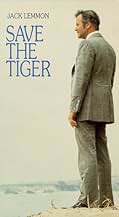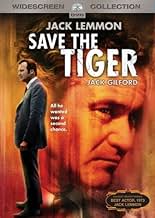Une journée et demie dans la peau d'Harry Stoner, patron d'une petite maison de prêt-à-porter qui s'approche inéluctablement de la faillite. Songeant avec amertume à sa jeunesse perdue, il t... Tout lireUne journée et demie dans la peau d'Harry Stoner, patron d'une petite maison de prêt-à-porter qui s'approche inéluctablement de la faillite. Songeant avec amertume à sa jeunesse perdue, il tire un bilan de sa vie.Une journée et demie dans la peau d'Harry Stoner, patron d'une petite maison de prêt-à-porter qui s'approche inéluctablement de la faillite. Songeant avec amertume à sa jeunesse perdue, il tire un bilan de sa vie.
- Réalisation
- Scénario
- Casting principal
- Récompensé par 1 Oscar
- 2 victoires et 5 nominations au total
- Ula
- (as Liv Von Linden)
- Tiger Petitioner
- (as Biff Elliott)
- Model
- (non crédité)
Avis à la une
He plays Harry Stoner, owner of an heavily indebted ladies designer clothes manufacturing company. The film covers just 2-3 days of his life and we get a pretty good idea of his sad existence in the urban jungle and what he has become - no longer a good, decent person fighting for the right cause. There are references to Stoner's war record and patriotism throughout the film. The fact that the US was fighting the very unpopular Vietnam war could have influenced the themes of this film.
There is little in the way of plot but there is a rich characterization made deeper by the crises in Stoner's life and Lemmon's excellent depiction of a man who is cracking at the seams. My favorite scenes were the ones in the car with the hippie girl towards the beginning of the film and the question she asked him and Lemmon's comic reaction....
I believe the strength of this film is that his performance allows it to strike a multi-generational cord with viewers...a key theme of the movie is the way the world has changed since they way we remembered it when we were younger, which I think is a pang that all of us get, no matter what age. The world always seems darker and more complicated now and concept that needs no real transposition between eras.
Harry Stoner is a man of his times...swing bands, baseball, and World War II. His life is still influenced by all three, but only in quick flashes of fond memories or flashbacks of a beach in Italy. Lemmon gives us a character that does what he has to do in order to maintain what he has worked for, and that rationalizes that which may or may not be quite on the up-and-up.
Jack Gilford is excellent as his partner in Capri Casuals, representing a voice of conscience that is not quite as blind to circumstance as Jack's character, and there are several other good performances in the film. Jack Lemmon stands out, as he does in most films, and richly deserved the Academy Award for this one.
Jack Lemmon delivers a brilliant, Oscar-winning performance as Harry Stoner, a middle-aged man at the end of his tether, who confuses his personal midlife crisis, and the failure of his fashion business, with what he sees as the USA's moral decline in the post-war years. Obsessed with the lost cameraderie of his active service in the war, with the baseball and jazz giants of yesteryear, and with the slain and fallen idols of the 60s (Kennedy, King, Monroe etc), he sleepwalks into his own moral abyss of an arson plot, comforting himself that he is no worse than the times in which he lives.
Lemmon's character is countered by those of Phil Greene, his business partner, convincingly played by Jack Gilford, and Meyer (William Hansen), the firm's veteran, expert cutter and refugee from Nazism. Phil does not suffer Harry's sense of disillusion, because he is too down-to- earth to have experienced the illusion in the first place; Meyer, also, despite superficial discontent with the changing times, gains strength from his skill and family life.
For me, the main theme here is the familiar one of the lost American Dream, and the film brings to mind the final lines of the seminal exploration of that theme, the Great Gatsby - "So we beat on, boats against the current, borne back ceaselessly into the past." Harry's American Dream is not of a golden future, but of a golden past; it isn't lost, it simply never existed. But, that said, in this movie thematic analysis definitely takes second place to appreciation of Lemmon's bravura performance.
The film almost has a low budget, made-for-television feel and look. But it still delivers an engrossing story of people under stress.
Le saviez-vous
- AnecdotesActor Jack Lemmon waived his usual fee and worked for scale plus a percentage of the gross. Scale was US $165 a week at the time.
- GaffesHarry wipes Fred's face almost completely clean of the red body paint. In a subsequent shot, Fred's face is covered with red paint again.
- Citations
Myra: Are you OK? Do you want something?
Harry Stoner: Yes. I want that girl in a Cole Porter song. I wanna see Lena Horne at the Cotton Club - hear Billie Holiday sing fine and mellow - walk in that kind of rain that never washes perfume away. I wanna be in love with something. Anything. Just the idea. A dog, a cat. Anything. Just something.
- ConnexionsFeatured in Paramount Presents (1974)
- Bandes originalesAir Mail Special
Composed by Jim Mundy, Benny Goodman & Charlie Christian
Meilleurs choix
- How long is Save the Tiger?Alimenté par Alexa
Détails
- Date de sortie
- Pays d’origine
- Langues
- Aussi connu sous le nom de
- Save the Tiger
- Lieux de tournage
- Sociétés de production
- Voir plus de crédits d'entreprise sur IMDbPro
Box-office
- Budget
- 1 000 000 $US (estimé)
Contribuer à cette page


































